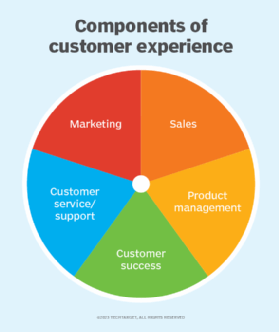
Getty Images
Customer success vs. account management: How do they differ?
Customer success and account management strategies help organizations grow in different ways. Customer success focuses on loyalty, while account management focuses on revenue.
To retain customers in a competitive landscape, organizations must offer exceptional CX across many customer journey phases, including post-sale interactions.
Post-sales support comes in many forms, including customer success and account management. Customer success teams train customers on products and help them reach long-term business goals, while account managers focus on account growth. Yet, both strategies help organizations nurture customer relationships long after the initial sale.
CX professionals should understand the difference between these departments, including their goals, responsibilities, skills, metrics and software, so they can assign the right responsibilities and tools to the right teams.
What's the difference between customer success and account management?
Both customer success and account management can improve CX and generate revenue, but they have different goals and people in these departments have different responsibilities and skills.
1. Goals
Customer success teams aim to improve customer loyalty through proactive customer service and relationship-building, not sales. Although organizations need sales and marketing teams to generate leads and promote products, customers wary of sales tactics might not trust these departments. A customer success team offers a different approach. These teams align their success with the customer's success, as opposed to increased revenue, which helps build trust.
An account manager, on the other hand, aims to grow accounts and increase sales. Account managers serve as a point of contact between customers and the organization and encourage customers to consider subscription upgrades and additional products.
2. Responsibilities
Customer success and account managers have different day-to-day responsibilities. Customer success teams aim to understand customers' goals and proactively help them avoid issues, while account managers focus more on sales.
Responsibilities of a customer success manager include the following:
- Manage client onboarding and training.
- Find the most appropriate tools and product configurations for customers.
- Offer proactive customer service to prevent potential problems before they happen.
- Conduct surveys to collect customer feedback.
- Communicate with product development and CX teams about common product and customer journey pain points.
Account managers have the following duties:
- Act as lead contact for specific accounts and quickly address customers' account and product questions.
- Add and track customer information in the organization's CRM software.
- Make upsells, cross-sales and contract renewals.
- Navigate negotiations and close agreements.
- Create sales reports.
- Develop marketing strategies.
Customer success representatives and account managers both focus on post-sale customer relationships. However, customer success teams act more as mentors, whereas account managers focus on continuing to sell to existing customers.
3. Skills
Customer success and account management skills overlap in some areas but diverge in others. Both roles require empathy because they involve customer service. For example, customers might reach out to customer success teams about problems with user adoption, or they might contact their account manager for billing questions. Empathy can help employees in both roles offer quality service and a positive CX.
Both roles also require people skills, because customer success and account managers need to build relationships. The customer success manager typically builds a stronger relationship because they act as an advocate and mentor to the customer, while the account manager focuses more on revenue growth. However, strong relationships can help account managers make cross-sales and generate revenue.
Additionally, strategic thinking skills can specifically help customer success managers because they devise strategies to help customers reach their long-term business goals. Account managers, on the other hand, need the ability to persuade and negotiate. Persuasion skills can help account managers nudge customers to consider the benefits of higher subscription plans, and negotiation skills can help them reach an agreement.

4. Metrics
Customer success and account management both affect customer satisfaction and sales, so metrics to measure their success can overlap. However, customer success metrics generally focus on loyalty, and account management metrics focus on account growth.
Important metrics for customer success teams include the following:
- Customer retention rate. Organizations calculate their CRR to determine the percentage of existing customers they retained over a given period.
- Net Promoter Score. NPS helps organizations identify their CX strengths and weaknesses and gauge how likely customers are to recommend their product to others.
- Customer health score. The customer health score lets customer success teams know which accounts have and have not found value in the product and might need additional training and attention.
- Customer effort score. The CES measures how easily customers complete tasks, such as setting up new software or troubleshooting issues.
Account management metrics include the following:
- Customer lifetime value. CLV helps organizations understand how much revenue their customers generate over the entire business relationship.
- Organic growth. An organization's organic growth measures the degree to which referrals, upsells and cross-sells have grown the business.
- Upsell and cross-sell rate. This metric overlaps with organic growth and measures the amount of revenue account managers generate as they upsell and cross-sell products to existing customers.
- Renewal rate. This metric tracks how many customers renew their contracts or subscriptions after their initial terms end.
5. Software
Customer success and account management teams rely on different types of software to reach their respective goals. While some tools overlap, customer success software generally includes learning platforms, help desk tools and feedback management capabilities. In contrast, account management software focuses on customer relationship management (CRM), sales enablement and contract lifecycle management.
Key features of customer success software include the following:
- Onboarding management. These tools help new customers implement and learn a product.
- Customer analytics. Analytics dashboards can track key satisfaction metrics, such as customer health score, NPS and CES.
- Product usage analytics. These analytics track how customers interact with a product. This indicates whether a customer knows how to use a product and gauges their overall satisfaction with it.
- Support ticket management. These customer service tools let organizations quickly resolve issues.
- Feedback management. Survey tools help organizations collect and process feedback to improve products and CX.
Examples of customer success software include Gainsight, Intercom, Zendesk and Totango.
Key features of account management software include the following:
- CRM. Account managers use CRM capabilities to track key accounts, contact information and customer interactions.
- Sales enablement. These platforms centralize sales collateral and track customer engagement with that collateral.
- Contract lifecycle management. These tools track contract renewal dates, predict whether customers are likely to renew and offer version control to manage contract changes.
Account management tools include Salesforce, HubSpot, Seismic and PandaDoc.
What is customer success?
Customer success is a business strategy organizations use to ensure customers get the most value from their products and services. Customer success teams might include a chief customer officer, a customer success director, customer success managers and onboarding specialists. These teams build long-term relationships with customers, guide them through onboarding and offer ongoing support, consultations and training.
Unlike customer service departments, which reactively respond to FAQs and technical inquiries, customer success teams proactively focus on customers' long-term success. These teams work one-on-one with customers to address pain points and figure out how their products can help businesses meet their goals.
For example, a SaaS vendor's customer success team might notice a drop in product usage from a customer account. The team could reach out to the customer for feedback as to why they think product usage dropped, and determine if a different product, feature, plan or additional training could help the customer find more value. This type of proactive service can help organizations identify and prevent churn.
What is account management?
Account management is a strategy to grow account revenue and offer customers a personal contact for account and product questions. An account manager, sometimes called an account executive, answers customer inquiries and takes responsibility for upselling, cross-sales and subscription renewals. This role combines customer service skills, such as empathy, with sales skills, like the ability to persuade and negotiate.
Unlike a standard sales role, which focuses on new customers, account managers interact with existing customers. They can increase revenue, as they can nudge customers to renew and upgrade their subscriptions and buy complementary products.
How customer success and account management teams work together
While customer success and account management teams have different focuses, both departments contribute to the organization's overall post-sale CX. Ideally, these departments communicate often and help each other meet customers' needs.
For example, customer success teams work closely with customers and understand their business goals, so they can let account managers know when to step in and suggest product upgrades. Customer success teams know which customers find value in their company's products and which don't. This information can help account managers decide which customers to engage with for subscription upgrades.
Also, customer success teams can let customers know when an additional feature or subscription upgrade can genuinely benefit them. If customers show interest, these teams can have the account manager negotiate a price and close the sale.
To better retain customers, organizations need quality post-sale support. Organizations with customer success and account management departments can have them work together to offer customers a positive CX long after their initial purchase.
| Difference | Customer success | Account management |
| Goals | Improve customer loyalty | Grow accounts |
| Responsibilities | Onboarding; training; proactive service | Answer account questions; upsell, cross-sell and increase renewals |
| Skills | Empathy; strategic thinking; relationship building | Empathy; negotiation; persuasion |
| Metrics | Customer retention rate; net promoter score; customer health score; customer effort score | Customer lifetime value; upsell and cross-sell rate; organic growth; renewal rate |
| Software | Learning platforms; help desks; customer feedback tools | CRM systems; sales enablement platforms; contract management tools |
Editor's note: This article was originally published in 2023. It was updated and expanded in 2025.
Tim Murphy is associate site editor for Informa TechTarget's Customer Experience and Content Management sites.







